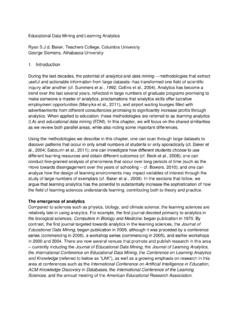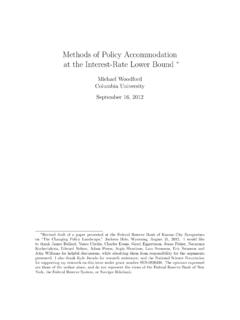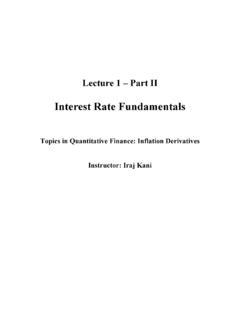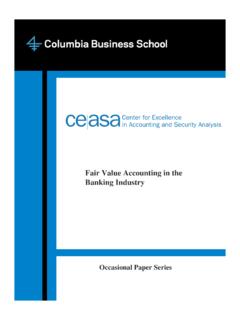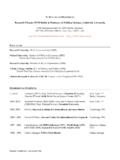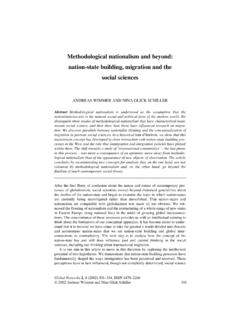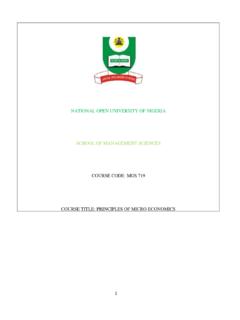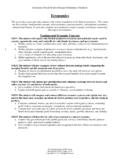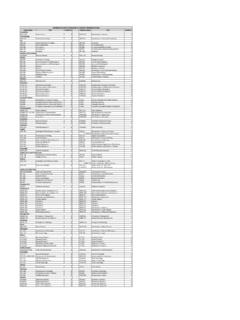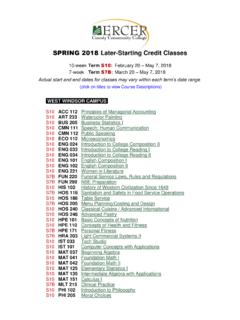Transcription of Economics W3211 – Intermediate Microeconomics …
1 Economics W3211 Intermediate Microeconomics - Spring 2016 Course Outline Contact Details Professor: Mark Dean Email: Classes: 4:10 to 5:25 Monday and Wednesday in Mathematics 207 Office Hours: to Friday, or by appointment (Room 1031 IAB) Website: ~md3405 CourseWorks: Teaching Assistant: Teck Yong Tan Email: Recitation: 6:00 - 7:00pm, Thursday, IAB 418 Office Hours: - 12:45pm, Monday, Lehman Library group study area Teaching Assistant: Evan Friedman Email: Recitation: 2:00 to 3:00pm, Thursday, IAB 410 Office Hours: 8:10 - 9:10pm, Monday, IAB 405 Teaching Assistant: Youzhihang Deng Email: Recitation: 7:00 -8:00 pm, Friday, IAB 405 Office Hours: 2:00 - 3:00 pm, Tuesday, Lehman Library group study area Teaching Assistant: Omeed Maghzian Email: Recitation: , Thursday, IAB 418 Office Hours: 10:00 - 11:00am, Monday Lehman Library group study area Prerequisites ECON W1105 or the equivalent; MATH V1101, MATH V1201 (or MATH V1207).
2 Course Outline and Goals The aim of this course is to teach you the basic tools of microeconomic analysis. These tools fall into two categories: 1. Models of decision making. (Almost) all economic analysis starts with a model of how people make choices for example how people decide what to buy, how much money to save, where to work and so on. This course will teach you the basic of the standard model of economic choice for consumers and firms. We will also touch on more advanced topics, specifically choice under uncertainty and behavioral Economics (the study of where the standard model goes wrong). 2. Models of equilibrium. A key feature of Economics is that it is interested in what happens when people interact. For example, in an economy with many consumers and firms, how are wages and prices determined, and who ends up with what stuff? This is the study of equilibrium.
3 As well as standard equilibrium analysis, we will also look at what happens when agents behave strategically . This is the study of game theory, which may or may not be as exciting as it sounds. Assessment Final grades will take into account homeworks, a short in-class quiz, the midterm and the final according to the following weighting scheme: 25% homeworks, 5% in-class quiz, 25% midterm, 45% final exam. Homeworks Homeworks will be available each Wednesday, and will be due in class the following Wednesday (homeworks can also be deposited in the boxes in room 1022 IAB prior to class). The TAs will then go through the homework solutions in their recitation sessions, return graded transcripts and post solutions. There will be approximately 8 homework assignments throughout the course. You are allowed (and in fact encouraged) to work in groups of up to 3 for homeworks. You can hand in one homework for your group, and will all get the same grade.
4 It is of course important for you to ensure that all members of the group contribute and understand the material: free riders are likely to find it tricky come exam time. Homework will be graded on a 10 point scale. Homework that is not handed in at the correct time will not be graded, and will receive a zero score. However, your worst homework grade for the semester will not count towards the final grade. You may also ask for your homework in advance if you know you are going to be busy in a particular week. Exams and Class Quiz In addition to homeworks, there will be one short class quiz, one midterm exam, and one final exam. The class quiz will take place in class on 15th Feb and will cover material up to and including 10th Feb. The midterm will take place in class on 9th March and will cover material up to and including 7th March. The final exam is currently scheduled for Monday May 9th at (though this is subject to change).
5 All exams will be closed book, and there will be rescheduling of midterm exams only in extreme circumstances. The date of the final exam is set by the university and cannot be rescheduled. Course Materials This course will be loosely based on Intermediate Microeconomics : a Modern Approach (9th edition) by Hal Varian, Norton 2014 (previous editions should work too). A cheaper alternative textbook you may find useful is A Short Course in Intermediate Microeconomics with Calculus by Roberto Serrano and Allan Feldman, Cambridge University Press, 2012. However, the course should also be self-contained. Everything you need will be presented in class and/or available on the class website. The textbooks are useful, but by no means essential. Course Policies Regrading Corrected assignments and exams will be available in the class mailbox at most seven days after the deadline or the date of the test.
6 Students then have at most seven days to introduce a complaint regarding a grade (that means exactly two weeks after the deadline or the date of the test or assignment submission). I deal personally with all complaints. Requests must be placed in my mailbox on the 11th floor of IAB. I expect them to be specific and motivated. This means that you must include a copy of the question(s) that need(s) to be re-graded, a copy of your answer(s) and the relevant section of the answer key, and an explanation as to why the question(s) need(s) to be re-graded. If I find the request motivated, then I will re-grade the question(s) myself (which may possibly result in a lower grade if I find it justified). My decision is final. Please do not use either my or the TAs office hours to complain about grades Academic Dishonesty As members of an academic community, each of us has a responsibility to participate in scholarly discourse and research in a manner characterized by intellectual honesty and scholarly integrity, and cheating on exams is a very serious violation.
7 Any suspected case of cheating will be reported to the university, and students who breach their intellectual responsibility in this regard should anticipate being asked to leave Columbia. Disabilities If you are a student with a disability and have a DS-certified Accommodation Letter please come to my office hours to confirm your accommodation needs. If you believe that you might have a disability that requires accommodation, you should contact Disability Services at 212-854-2388 and Class Conduct Cell phone use is not allowed. Laptops are fine for taking notes, but please respect your classmates and instructor by limiting yourself to class-related activities. Though you may be a phenomenal multi-tasker, using a laptop for purposes other than taking notes is distracting to those around you Syllabus This is a broad outline of the topics that I hope to cover in the course.
8 Note that this is preliminary, as how fast we can cover these topics depends to some extent on you. Consumer Theory (or How do people make choices ?) Optimization problems The budget set Preferences and indifference curves Utility functions Optimal choice Demand Functions, comparative statics and the Slutsky Equation Consumer Surplus Market equilibrium and efficiency (or Who ends up with what stuff? ) Definition of equilibrium The Edgeworth box Walras law How is equilibrium reached? Pareto Equilibrium 1st Fundamental Welfare Theorem 2nd Fundamental Welfare Theorem Problems with the welfare theorems Property rights and Coase theorem Producer Theory Perfect Competition (or How do firms behave when there are lots of them? ) Technology Profit Maximization and Cost Minimization Firm Supply Equilibrium in a production economy Welfare theorems in a production economy Taxation Monopoly (or How do firms behave when there is one of them?)
9 The monopolist s problem Monopoly behavior Cost of monopolies Game Theory (or What happens when people behave strategically? ) The concept of a game Nash equilibrium Subgame perfect Nash equilibrium Applications of Game Theory Oligopoly Choice under Uncertainty (or When do people take risks? ) Choices between gambles Expected utility theory Risk aversion Asymmetric Information (or Should you buy a used car from someone you don t know? ) The market for lemons Adverse selection Moral hazard Behavioral Economics (or What does standard Economics get wrong? ) Do people maximize utility? Do people maximize expected utility? Other-regarding preferences Temptation and self control Approximate Schedule Week Beginning Topics 18th Jan Introduction 25th Jan Consumer Theory 1 1st Feb Consumer Theory 2 8th Feb Equilibrium in an Exchange Economy 1 15th Feb Equilibrium in an Exchange Economy 2 AND CLASS QUIZ 22nd Feb Equilibrium in and Exchange Economy 3 and Producer Theory Perfect Competition 1 29nd Feb Producer Theory Perfect Competition 2 7th March MIDTERM and RECAP 14th March SPRING RECESS 21st March Producer Theory Perfect Competition 3 28th March Producer Theory Monopoly 4th April Game Theory 1 11th April Game Theory 2 18th April Choice Under Uncertainty 25th April Behavioral Economics 2nd May RECAP

